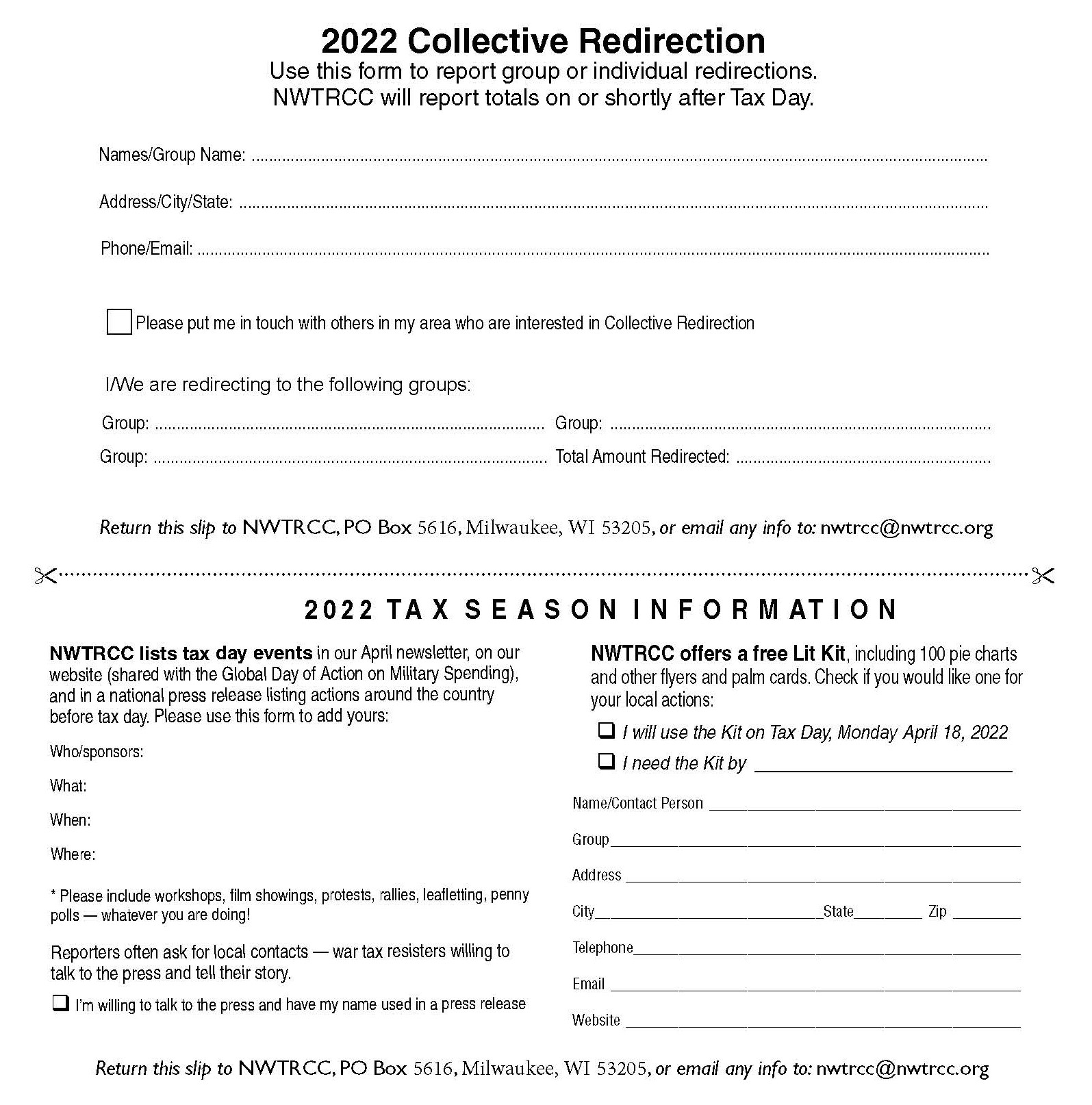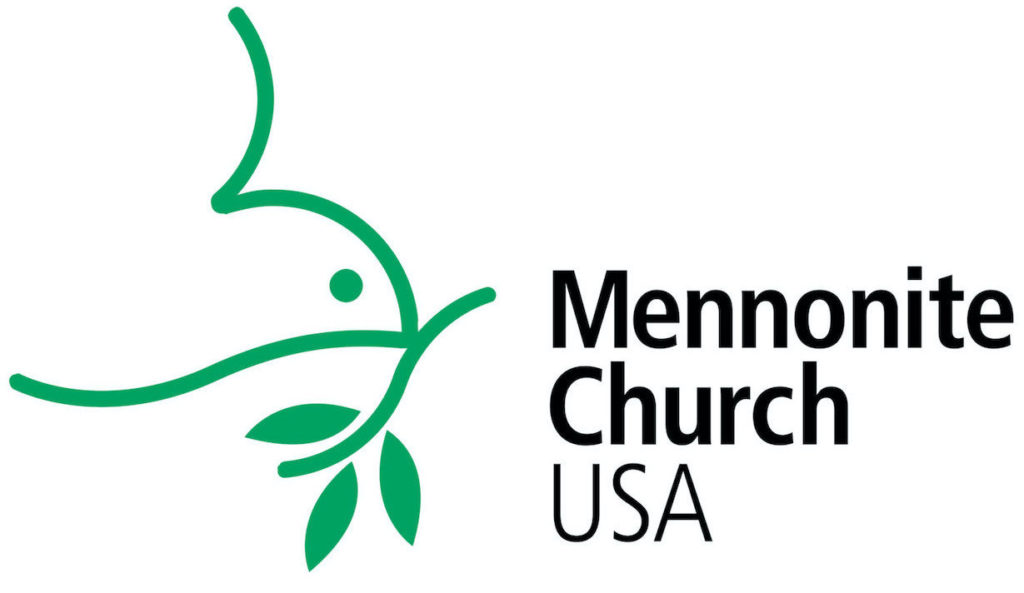 More Than a Paycheck,
More Than a Paycheck,
REFUSING to PAY for WAR
February – March 2022
Contents
- Tax Season 2022 Sign-On Campaign
By Lincoln Rice - IRS Annoyances vs.
Your Money or Your Life By Ruth Benn - Counseling Notes: 2022 IRS Standard Deduction and Taxable Income Level • Build Back Better Bill to be Broken Apart • Still a Massive Back-Log of 2020 Returns
- Many Thanks to everyone who supports NWTRCC with their volunteer time or financial donations and to the following groups for recent donations
- Network Updates
- In Memoriam: David Bassett By Malachy Kilbride, Director of the National Campaign for a Peace Tax Fund
- Roger Franklin: Inspiring Noncooperation By Ruth Benn
- War Tax Resistance News Spanish War Tax Resistance Funds about 110 Social Projects • Millions of Myanmar Citizens Refuse to Fund Military Regime
- Network News: National NWTRCC Conference Online: April 29 – May 1, 2022 • WTR Counselor Training on Zoom • Ask Your Church to Support NWTRCC • Nominations Open for NWTRCC’s Administrative Committee
- Mennonite Statement on U.S. Defense Budget Promotes War Tax Resistance
- Creative Nonfiction: In Flight
- Profile Symbolic War Tax Resistance
By Rick and Carolyn Yoder
Click here to download a PDF of the February/March issue
A New War Tax Resistance Outreach Tool: Tax Season 2022 Sign-On Campaign
By Lincoln Rice
When we hosted our youth focus groups in 2019 and 2020, it became obvious that the more young activists learned about war tax resistance, the more positive they viewed it as a viable tactic. One question that came out of those sessions was how to initially communicate war tax resistance information with young activists? Already having a personal connection through some other form of activism seems to be the most fruitful.
Another factor that often dissuades young (and not-so-young) activists from practicing war tax resistance is the complexity of the tax code. How someone practices war tax resistance depends on their values, risk tolerance, and their individual situation. There is not a cookie-cutter method.
With these factors in mind, the NWTRCC Outreach Committee has organized a “Refuse to Pay for War” sign-on campaign. We have dedicated a webpage to this campaign, which begins with a short statement in which the signer commits to “divesting from war by refusing some or all of our federal tax dollars that fund it, or by living below the taxable income level.” If one goes to NWTRCC’s homepage (nwtrcc.org), the main picture at the top of the page advertises the sign-on statement and links directly to it.
Here is the statement that we are asking folks to sign:
We are divesting from the taxes that fund war and investing in people, planet, and justice. The United States’ endless war on terror is continuing with drone warfare in Afghanistan and from over 800 overseas military bases outside the United States. In addition, the recently signed National Defense Authorization Act approved $25 billion more in funding for fiscal year 2022 than the Pentagon requested. We are not waiting for government approval of our actions. We are divesting from war by refusing some or all of our federal tax dollars that fund it, or by living below the taxable income level. We invite you to join us in this public campaign of civil disobedience to war and war funding.
We would invite everyone in our network to sign the statement and include an organizational affiliation if they have one. In signing the statement, NWTRCC can verify that we have up-to-date contact info for the people we already know. By providing an organizational affiliation, prospective signers will see the broad variety of groups that war tax resisters are involved with.
We would also ask that you share the web link (nwtrcc.org/sign-on-statement) to the sign-on page with friends, other activists, and with other groups with which you are involved. Below the statement are links to several resources aimed at folks considering war tax resistance. These include How to Resist, Consequences of Resistance, Resisting a Small or Symbolic Amount, Climate Emergency & War Tax Resistance, Student Financial Aid & War Tax Resistance, and a List of Current Signers.
The “Resisting a Small or Symbolic Amount” resource was created specifically for this campaign. Previously, many people tested the waters of war tax resistance by first practicing phone tax resistance. Since phone tax resistance is no longer an option for most people, we wanted to provide another option for people who would like to try war tax resistance with less risk.
IRS Annoyances vs.
Your Money or Your Life
By Ruth Benn
Some months ago I wrote an article about how the IRS had improperly applied my estimated tax payments for 2020 to the earliest tax years for which I had an open balance [Editor’s Note: published in the Oct-Nov 2021 issue of this newsletter]. In that way they wiped out the balance from 2011 and part of it from 2012, thus circumventing the 10 year statute of limitations for collection. I should have gotten beyond the statute with the approximately $1,400 due that year (before interest and penalties).
Misapplying payments is against IRS regulations, and I wrote a letter to the IRS right after receiving the notices asking that my estimated payment be returned to my 2020 Social Security payments. There has been no response to my August 25, 2021, letter, which is no surprise if you’ve seen the recent announcements from the IRS about their ongoing staffing shortages and “paperwork backlogs.” My letter is in some big pile with millions of other letters, returns, and amended returns that have not been processed. “Paper is the IRS’ Kryptonite, and the agency is still buried in it,” says the National Taxpayer Advocate Erin Collins in her annual report to Congress.
Recently seven IRS collections letters arrived in one day’s mail delivery, which reminded me of this hanging issue. The letters were for 2012 through 2018, so I realized they had dropped 2011 and never adjusted that estimated payment. I’ve thought of checking that online account the IRS has set up for each of us, and I know some of you look at yours, but somehow I can never get past filling out the personal info to see what they’ve got for me.
Today, just for the heck of it, I tried calling the IRS. I was not hopeful of getting through, and if I were to reach someone, I was not hopeful that they would be helpful. After going through a few rounds of “press this number” now “press this number” I was told my hold would be 30-60 minutes. I decided to hang up and try pressing a different option. Same result. I stuck with the hold for a while. “Calls are answered in the order received. Don’t hang up.” Then after about 10 minutes, “Consider hanging up and check your account online.” After 14 minutes I took the advice about hanging up.
It’s at this point when you have to keep reminding yourself why you got into this form of resistance. Since I couldn’t be a draft resister, I became a war tax resister to demonstrate my refusal to participate in war. I want to challenge militarism and military spending. I did expect the consequences to be worse than receiving piles of threatening letters, one summons to an IRS office in 2009, one bank account seizure, and spending 14 minutes on hold with the IRS.
There have been times when war tax resistance in the U.S. has gotten the attention of the powers that be and waves of resisters gained media attention as they fought property seizures or legal cases, some of which led to jail time. The Vietnam War era and the 1980s were particularly active. It seems we are too small a movement now to inspire a crackdown and thus more attention to the real issue. And the cuts to the IRS budget have over recent years lowered the economic risks too.
I go from my IRS annoyance (and really, frustration that our resistance is largely ignored) to reading the stories from Myanmar of refusal to pay tax to the government-owned power company, among many other acts of economic resistance to the military rulers. The resistance has led to serious revenue shortfalls for the coup leaders, who have responded by sending soldiers into neighborhoods and homes demanding with guns pointed that people pay the tax. It’s quite an example of the power of tax refusal, though the consequences to the refuser may be dire.
Once again from the comfort of my home and well-fed life, I ask myself could I be like Dr. Wai Phyo Aung, 36, a Mandalay dentist quoted in a Firstpost article, who has not paid his bill since the coup and says: “If they come to my house and cut the electricity, I don’t care. I will never pay the bill. I don’t care even if they kill me. I won’t let my money kill citizens and feed the war dogs.”
Counseling Notes:
Purpose of this Section
This section serves as a hub for war tax resisters to keep abreast of the kind of actions the IRS is taking to collect federal tax debt. It also aids WTR Counselors, who are war tax resisters who volunteer to support existing and potential resisters. These counselors have undergone a day-long training to non-directively counsel individuals and aid them in determining their goals in regards to WTR, to discover the options most appropriate to their situation, and to assess realistically the possible consequences of those options. A current list of counselors by state can be found on the NWTRCC website (go to the “About Us” tab and click on “Local Contacts & Counselors”).This training is usually offered once a year and the next training will be online in early 2022. If you would be interested in attending one of these trainings, please contact the NWTRCC office at nwtrcc@nwtrcc.org or (800) 269-7464.
2022 IRS Standard Deduction and Taxable Income Level
Trump’s tax overhaul bill eliminated the personal exemption. Now there is only the Standard Deduction figure that sets the taxable income level.
| Category | Standard Deduction |
|---|---|
| Single | $12,950 |
| Married, Filing Jointly | $25,900 |
| Married, Filing Separately | $12,950 |
| Head of Household | $19,400 |
For each married taxpayer who is at least 65 years old or blind, an additional $1,400 standard deduction may be claimed. If the taxpayer is single, the additional standard deduction amount is $1,750.
A single person can earn up to $12,950 and owe no federal income tax. You may be able to make significantly more than the amounts indicated above and owe no income taxes. NWTRCC’s Practical #5, Low Income/Simple Living as War Tax Resistance, includes information on legal ways to reduce taxable income and owe no federal income taxes ($1 from the NWTRCC office; read it free at nwtrcc.org). We suggest that nonfilers fill out the forms and keep their receipts for reference in case their circumstances change or the IRS comes calling.
Payroll taxes for Social Security and Medicare begin to apply at a lower income level than one’s standard deduction. If you do not file or pay estimated taxes, you may be liable for Social Security taxes. If you are an employee, these payroll taxes are automatically withheld as a percentage and you cannot resist those taxes.
Build Back Better Bill to be Broken Apart
President Biden said on January 19 that he was willing to break his Build Back Better (BBB) plan into separate “chunks” so that certain parts could pass. He hopes to come back to other parts of the bill later in the year. This means that aspects of the bills, such as adding $80 billion of additional funding to the IRS over ten years and stricter reporting requirements for banks are unlikely to reach Biden’s desk in the near future.
Still a Massive Back-Log of 2020 Returns
As of December 2021, the IRS still had 6.7 million unprocessed 2020 tax returns. We have seen the result of this backlog in Ruth Benn’s situation (as reported in her cover article) and know there are others in our network whose returns have not been processed. The IRS has stated that people who would like their 2021 tax return processed in a timely fashion should file electronically. If you do file and are willing to mail in a paper return, know that you are greatly frustrating the IRS.
Many Thanks
Thanks to everyone who donate to NWTRCC! Remember, you can also donate online through PayPal (not tax deductible) or Resist (tax deductible) by clicking on the “Donate” button at nwtrcc@nwtrcc.org. (Please let the NWTRCC office know if you use Resist.) It’s never too late to send that contribution to support our work.
We are very grateful to these WTR groups and alternative funds for their redirections
and Affiliate dues: Boulder War Tax Info Project (Colorado); Southern California War Tax Resisters; St. Lawrence Catholic Worker House (Kansas City, KS); Casa Maria Catholic Worker (Milwaukee, WI); Birmingham War Tax Objectors
Network List Updates
The Network List of Affiliates, Area Contacts, Counselors, and Alternative Funds is updated and online at nwtrcc.org, or contact the NWTRCC office (nwtrcc@nwtrcc.org or (800) 269-7464), if you would like a printed list by mail.
Don’t forget, you can find us on
Facebook • Twitter • YouTube • Instagram
or join our discussion listserve.
Click on the icons at nwtrcc.org
Advertise to Activists! See the advertising rates for this newsletter or contact the editor at (800) 269‒7464.
Consider a Bequest
NWTRCC accepts bequests which can be arranged through your will or other estate plan.
Simply name NWTRCC as the beneficiary of a portion of your estate or of particular assets in your estate, or contact the NWTRCC office for arrangements through one of our 501c3 fiscal sponsors. A bequest costs nothing now, yet it may give you great satisfaction to know that your gift will live on in NWTRCC.
More information: nwtrcc.org/bequests, (800) 269-7464, or nwtrcc@nwtrcc.org.
“I have been donating quarterly to NWTRCC for many years, because as a life-long war tax resister I feel I definitely need NWTRCC to be there and to be strong.”
— Becky Pierce, Dorchester, Mass.
Please join Becky as an annual, monthly, or quarterly pledger to NWTRCC. See the donate page on our website to pledge through Paypal (any amount monthly) or through Resist (monthly, quarterly, and annual options). If you would like a pledge packet to give by check, please contact the NWTRCC office, 800-269-7464. Thank you!
War Tax Resistance News
Spanish War Tax Resistance Funds about 110 Social Projects
NWTRCC’s November 2021 Conference featured a speaker from Spain’s war tax resistance group, Grup Antimilitarista Tortuga. In December, they reported that the group’s 2021 war tax resistance campaign had redirected nearly 25,000 to 109 social projects. At least 370 people participated in the resistance and redirection. Significant funds were redirected to justice and peace organizations, such as Internacional de Resistentes a las Guerras (IRG), KEM-MOC Bilbo, Acción Colectiva de Objetores y Objetoras de Conciencia de Colombia (ACOOC), Coordinadora de ONGs de Lleida, Ongi Etorri Errefuxiatuak Bizkaia, SETEM, Alde Zaharreko Etxebizitza Taldea, and Open Arms.
Millions of Myanmar Citizens Refuse to Fund Military Regime
Myanmar’s citizens continue their work to defund the military regime, which took control of Myanmar during a coup in February 2021. In the previous issue of this newsletter, we reported on the work of student groups to dissuade outside governments and corporations from paying taxes to the Myanmar government until the military government is removed.
Additionally, millions of people in Myanmar are refusing to pay their utility bills as a way to defund the military regime. To counteract this, the government has begun sending soldiers to the homes of those with an outstanding utility bill to demand payment. With guns in hand, the soldiers have been telling the refusers that if they do not submit payment at the government’s utility office, they will be killed. Since the military coup, nearly 1,500 civilians have been killed, including nearly 200 people who have died at interrogation centers.
In Memoriam: David Bassett

David Bassett. Photo by Ed Hedemann
By Malachy Kilbride, Director of the National Campaign for a Peace Tax Fund
Friends, it is with a mixture of sadness and gratitude I share with you that our founder, David Bassett, passed away peacefully in the presence of his family. However, thanks to your continuing support, our long-term work lives on. I am mindful that the campaign initiated by David Bassett for our civil rights, as conscientious objectors to war with our conscripted income taxes, must continue with renewed commitment. Thanks to the first steps initiated by David our journey continues!
Because the work of the National Campaign for a Peace Tax Fund is a grassroots effort I ask that you use our most important tool, our online petition (peacetaxfund.org/petition/), which will be shared with members of congress as constituents let their congressional members know of their support for H.R. 4529, the Peace Tax Fund bill introduced this session by Rep. Jim McGovern of Massachusetts.
David Bassett’s dream for a Peace Tax Fund can become a reality and will strengthen the rights of conscientious objectors. As a Quaker, David understood the importance of this long-term work. Like so many peacemakers, David saw his dream from a mountaintop as he looked over and saw what a new way of living would look like for those who want an end to war. Although David did not realize this dream in his life we must continue our shared journey for the First Amendment rights of conscientious objectors to war.
Roger Franklin: Inspiring Noncooperation
By Ruth Benn

Roger Franklin at the 2008 International WTR Gathering. Photo by Ed Hedemann.
Refusing to pay taxes to avoid complicity in state preparations to commit genocide with nuclear weapons, long time British war tax resister Roger Franklin was sentenced to 28 days in Gloucester Prison (and a further 21 days in 1996). His run-ins with the tax collectors also led to bankruptcy proceedings against him.
(Excerpt from the History Pages of the National War Tax Resistance Coordinating Committee, 1995)
One of those chance encounters on the internet led me to an obituary of Roger in The Guardian, and another one on the Campaign for Nuclear Disarmament Salisbury website. He died at age 93 just over a year ago now. This got me to thinking about the 2008 International Gathering of War Tax Resistance and Peace Tax Campaigns in Manchester, England, where I had the pleasure of meeting Roger and feeling very humbled by his acts of creative noncooperation with governments that perpetuate war.
In the 1970s Roger had purchased a home and 17 acres of land he named Tickmorend and declared it a nuclear free zone. In 2005, he increased his independence from the state and announced “The Republic of Tickmorend” or “Tickmorend Free Space” in response to “the madness of governments.” “I’m no longer implicated in aggressive wars, aggressive economics and nuclear insanity…. The state is a protection racket, which doesn’t protect you. It endangers you even more.”
Roger also enjoyed reading about his run-in with the law when he refused the census in Britain in 2012 because it was being carried out by the “war machine corporation” Lockheed Martin.
NWTRCC’s recent gathering included presentations about tax refusal in Spain and Britain with mention of the differences between refusing taxes in the U.S. and other countries. Most countries don’t have “voluntary” filing like we do here, so in that way we are lucky to be able to make choices about whether to pay and how much to pay. But I was sorry to hear that the Money Rebellion campaign in Britain, which is focused on climate issues, had not been able to make contact with war tax resisters in that country and was not yet connecting the issues of war and the climate crisis.
Conscience – Taxes for Peace Not War is active in Britain, although they seem to have drifted more to promotion of non-military security and legislative campaigns. Nevertheless, they still promote some war tax resistance, and their website features a letter to Inland Revenue from Robin Brookes, who helped organize that 2008 Manchester conference. Robin says in his letter,
I have wondered, on a purely personal level, whether I can continue to hold out in the face of accumulating interest and fines, but then I see that our government would not be party to the UN talks on making nuclear weapons illegal. …I have to continue to act under conscience.
We can often feel alone in our war tax refusal, so it is heartening to remember that wherever and whenever there are taxes collected for war, there will always be some stubborn, brave, and inspiring individuals who will resist and refuse to cooperate no matter the consequences. Always.
 Mennonite Statement on U.S. Defense Budget Promotes War Tax Resistance
Mennonite Statement on U.S. Defense Budget Promotes War Tax Resistance
“Statement on the Value and Morality of the 2022 U.S. Defense Budget” was issued on December 14, 2021 by the Mennonite Church USA. The statement begins by pointing out the misplaced priorities of the federal budget. For example, “The advocacy group Public Citizen estimates that a $25 billion investment in vaccine production would produce enough vaccines to achieve widespread global inoculation against COVID-19. The bill passed by Congress is nearly $25 billion more than the president’s request.”
To respond to these misplaced priorities, the statement notes the recent creation of MC USA’s Church Peace Tax Fund, which “provides individuals with a tangible way to support the church’s ongoing peace mission, while symbolically protesting government spending on war and militarism.”
Lastly, the statement explicitly asks church members to consider war tax resistance. Several resources for war tax resistance are offered, including the NWTRCC website and Dave Gross’s edited book, We Won’t Pay! A Tax Resistance Reader.
Network News
Mark Your Calendars!
National NWTRCC Conference Online: April 29 – May 1, 2022
Mark your calendars for our next national gathering. Unfortunately, we have will still have to meet on Zoom. Hopefully, we can return to in-person meetings for November. Information for the May meeting will be posted on the web in the near future (see nwtrcc.org/programs-events/ or call 262-399-8217). The NWTRCC business meeting is Sunday morning, May 1 (open to all). Note: Proposals for the May meeting must be submitted to the NWTRCC office by April 7, 2022.
WTR Counselor Training on Zoom
The next WTR Counselor Training is scheduled for Saturday February 19 (11a-4:45pm Eastern/ 8a-1:45p Pacific) on Zoom. Counselors are war tax resisters who volunteer to support existing and potential resisters by helping them to understand the motivations and methods of war tax protest, resistance, refusal, and redirection, and to understand the consequences of the choices they make. More information about being a counselor can be found at nwtrcc.org/about-nwtrcc/join-us/. If you are interested in becoming a WTR counselor or local contact for your area, contact the NWTRCC office.
Ask Your Church to Support NWTRCC
If you are connected to a church or religious congregation that you think would be open to supporting NWTRCC financially, NWTRCC has a webpage with resources on how to reach out to your religious group. The webpage (nwtrcc.org/church) has a sample letter as well as links to NWTRCC’s annual reports, which a religious congregation might find helpful in deciding whether to make a donation to NWTRCC. Even if your church denies the request, it is an opportunity to raise awareness about war tax resistance. If you would like any help in formulating a request to your church, feel free to contact Lincoln at the NWTRCC office.
Help keep NWTRCC Strong and Growing!
Nominations Open for NWTRCC’s Administrative Committee (AdComm)
The AdComm gives oversight to business operations, helps plan two gatherings each year, keeps in touch with consultants between meetings, and meets face-to-face at the May and November gatherings (and by Zoom in February and August). We need to fill two seats, and new members will be selected from nominees at the May 2022 meeting. They serve as alternates for one year and full members for two years (three years total). Travel to meetings is paid for full members and alternates filling in for full members who cannot attend. Each nominee will receive a nomination letter from the NWTRCC office with more details about what’s involved as a member of this important committee.
Call, email, or mail your nomination(s) to
NWTRCC, PO Box 5616, Milwaukee, WI 53205
800-269-7464 or nwtrcc@nwtrcc.org
Deadline: March 15, 2022
Creative Nonfiction
In Flight
[Editor’s Note: Previously published in Meat for Tea.]

Scarlet Tanager in a Tree. Photo by Patrice Bouchard on Unsplash.
You were deafened. The sound was intolerable; it violated your sense of decency, your love of quiet, and your yearning for solitude. Why, on the top of this rather small green hill in southeast Vermont, was there this unholy din? It was drowning out the songs of scarlet tanagers and dark-eyed juncos, the scurrying of chipmunks, and the impressive (and gravity defying) hum of insect wings in flight. As the volume crescendoed it crushed your thoughts until all that was left was the urge to scream “Shut up!” You imagined this is what a tornado sounded like before it touched down and that the vortex of sound might suddenly pick you up. You’d be launched swirling up-wards, completely consumed by the sound.
Even though it felt and sounded like the two circling jets were right on top of you they were in fact probably thousands of feet above the granite boulder where you were sitting in the midst of green and copper colored shrubbery. Against a blue backdrop they were putting on a show—swooping, diving, chasing—you hadn’t paid to see. Except, well, you’d paid taxes for years, so this interruption to the day (and to peace and to the climate) was your fault in some small, but ongoing, way. You undeniably had a hand in this effrontery.
A hiker told you the jets were coming by every morning for weeks. It was better, he said, to come later in the day. You couldn’t focus on what he was saying, because all the space in your mind where
listening could take place was filled with sound and consumed by outrage, frustration, and indignation at the illogic of the scene. You tried to catch glimpses of the jets, but, because they were so fast and small against the expanse of sky, it was almost impossible to do except for the briefest of moments; it left you with
the disorienting feeling they were everywhere and nowhere all at once.
Eventually the planes sped off to the west to torment other unsuspecting hikers. As soon as they left you saw three birds of prey crest the hilltop. Swooping, diving, chasing. Though thousands of feet closer to you than their mechanical imitators had been, you couldn’t hear their show, but you could feel their celebration at the air being theirs again and the contrast was mesmerizing.
— Lindsey Britt is a baker, an organizer of people and things, and an amateur ethicist. Her work has been published in Waging Nonviolence and The Commons. She lives in Vermont.
Profile
Symbolic War Tax Resistance
By Rick & Carolyn Yoder

Rick & Carolyn Yoder have been resisting a symbolic amount (about $200) each since they married in 1975. Courtesy of the Yoders
Carolyn and I have been war tax resisters since we were married in 1975. Although we were both raised as Mennonites and continue to be members of the Mennonite Church, one of the three historic peace churches in the U.S., we both had experiences after college while doing volunteer work overseas (before getting married) that generated some ethical dilemmas that led us to the decision to be war tax resisters.
Some war tax resisters choose to claim high deductions, not file tax returns, live under the poverty level, or a variety of other options as a way of resisting. We both have regular jobs that generated enough income (Carolyn is a psychosocial trauma therapist and I am a retired economics professor and international health reform consultant) that we had taxes due each year and thus submitted tax returns each year. We claim enough deductions [on our W-4 forms] or withhold enough of our self-employment tax so that we have a balance due the IRS each year. With those returns we typically withhold around $200 rather than 48 percent of our taxes due — the estimated percentage of the Federal Budget going to military spending. Withholding the full 48 percent would certainly have more integrity, but for a variety of reasons — or maybe “excuses” would be a better word — we have not done that.
We send a letter to the IRS with our tax returns explaining what we are doing and why, with copies to the White House, our Congresspeople, Senators, and others. We send the $200 (or whatever the amount withheld) to organizations doing peacebuilding work, that is, we are redirecting our war taxes to non-violent life giving causes.
We’ve been fortunate in having a faith community that supports these symbolic acts of resistance. In 1988, Community Mennonite Church, where we are members, took an official action to support — morally, financially, and otherwise — its members who as an act of faith and conscience, choose to withhold all or some of their military taxes. We include with our tax returns our church’s letter of support for these actions. There are about 8 or 10 households at Community Mennonite who do this — as well as a number of other households in the Harrisonburg, Virginia area where we live. We are grateful for that.
What’s been the response of the IRS? Each quarter we get a computer-generated letter from them telling us of overdue and unpaid taxes along with penalties, interest, and warnings. Each letter expresses increasing levels of threat. I respond to each one enclosing our original letter to the IRS along with Community Mennonite Church’s letter of support.
The IRS usually finds ways to get their money eventually — typically, by putting a levy on our bank account, taking it from my Social Security, or from Virginia state taxes due us.
Does it take a lot of time? It’s a hassle — perhaps an hour each quarter — but not that big a one. We’ve never been audited, so if we were, then it would take a lot more time. But we do keep records of everything just in case we are audited at some point. Is our church’s letter of support a deterrent to being audited? We don’t know but at least it sends a signal that this act of resistance is from more than a lone individual.
We know our actions have no effect on reducing military spending, but it does change us and perhaps, as John Lewis said, “it makes good trouble.” It’s a small way of going beyond talk to action and aligning our lives a little more with our deepest values. It’s also an act of saying “there’s a better way”; a small statement of our witness for peace.
More than a Paycheck
Editor Lincoln Rice
Production Rick Bickhart
More Than a Paycheck: Refusing to Pay for War is a bimonthly publication of the National War Tax Resistance Coordinating Committee, a clearinghouse and resource center for the conscientious war tax resistance movement in the United States. NWTRCC is a coalition of local, regional and national affiliate groups working on war tax related issues.
NWTRCC sees poverty, racism, sexism, homophobia, economic exploitation, environmental destruction and militarization of law enforcement as integrally linked with the militarism which we abhor. Through the redirection of our tax dollars, NWTRCC members contribute directly to the struggle for peace and justice for all.
Paper Subscriptions are $25 per year. Digital subscriptions are free.
NWTRCC
P.O. Box 5616, Milwaukee, WI 53205
(800) 269‒7464
(262) 399‒8217
nwtrcc@nwtrcc.org
social media: socialmedia@nwtrcc.org
newsletter: wartaxresister@nwtrcc.org
www.nwtrcc.org
